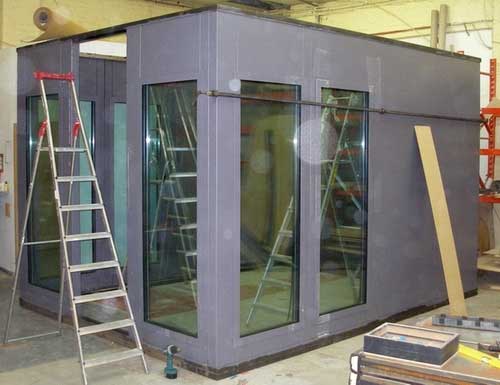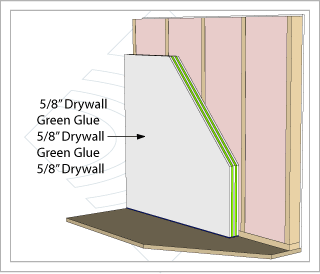
Reader Mark writes: “Have you ever done any articles asking for tips and tricks about how to soundproof a DJ home studio? It’s something I’d love to know more about as I’m always wary of annoying my neighbours even though I keep my music to a reasonable level.”
Digital DJ Tips says:
It’s a great question, Mark. The first thing to say is that people often confuse soundproofing with improving the audio characteristics of the room.
Egg boxes stuck to the walls, big heavy items of soft furniture, rubber padding, adjusting the angles of corners, carpets and curtains and so on all to a greater or lesser degree have some influence on the acoustics within the room, but are practically useless at cutting out the “sound leakage” to other areas (usually, of course, your neighbours or other family members). The truth is, it’s very hard to insulate a room (so you can’t hear what’s going on within it from the outside), and it’s also expensive, because it basically means building a complete room within the room, insulated from the outer walls not only at the sides, but also the top and bottom.
However, I have seen people have some degree of success with less drastic measures. So roughly in order of expense and effort, starting with the easiest / cheapest, here are some tips:
How to soundproof a DJ home studio

- Get your speakers on spiked stands. Some people swear by suspending their speakers to achieve this, others by using thick rubber pads, but I prefer rigid spiked stands. If your speakers are on shelves, or mounted to walls, the whole wall will vibrate due to the direct contact. Spiked stands hold the speakers rigid (which is good for sound quality), while reducing the amount of vibration transmitted to the floor. It doesn’t make a massive difference, but it does make a difference
- Do all the usual audio improvement / dampening stuff. As mentioned above, getting your room so the sound within it is as nice as possible, using carpet, heavy curtains, soft furnishing, plants in corners and so on has a negligible effect on “bleed”, but it can have an awesome affect on how good the music sounds within your room, so it’s worth doing anyway. And while it doesn’t have a huge affect on soundproofing, it does make some difference – so to an extent it’s a win/win
- Darken the room and look for light! Here’s an easy trick. Make the room as dark as you can, and look for light. Anywhere light is coming in is somewhere sound can also get out. Cracks in doors and so on can easily be dealt with to reduce some of the sound escaping
- Seal the gaps around electrical outlets, AC fittings, pipes etc. This one is an easy kill too. These fittings are usually fitted in enormous cavities that don’t needed to be so big. Remove the cover, and fill the gap with acoustical caulk (it’s supplied in tubes like silicone sealant). This will make your walls more soundproof
- Fit dry wall. Dry wall panels are typically 5/8″ thick and relatively cheap to fit compared to other structural changes. They can be fitted in a double layer the walls, ceiling and even the floor in your practice room. If you separate the layers using a product like Green Glue, you’ll get some of the benefits of professional soundproofing at a fraction of the cost, as such a system absorbs many of the soundwaves before they get a chance to vibrate the outer walls
Finally…
Just setting up so your speakers are really close to your head is such an obvious one, but if you can do this you simply won’t need things as loud to get the same effect when you’re mixing. It has to be worth a try, as all of the above cost money. And if all else fails, why not try and talk a venue you DJ at to let you practise there before they open one day at the weekend, for instance? Then you’ll have no need at all to work out how to soundproof your DJ home studio, and can go as loud as you like…
Do you have any tips to share on soundproofing a practice studio? Please feel free to add your advice in the comments below.








